|
Progressive Men of Iowa
1899
Progressive Men
Index
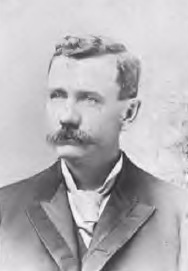 CONLEY, Joseph Bernard, is one of the craft
of honest millers whose "mill goes round '' at the
beautiful little city of Lake Mills. The parents of Mr.
Conley were natives of Vermont, but removed to Wisconsin
in 1850, where they engaged in farming. They reared a
family of eleven children, five sons and six daughters,
which, together with the few opportunities for enriching
one's self afforded by the early times in Wisconsin,
prevented any great accumulation of this world's
goods.
There were no railroads in the neighborhood where
they resided, and they were compelled to haul their farm
products to Milwaukee by ox team, and as that city was
eighty miles away they would receive scarcely enough
from their produce to pay the expenses of the trip. In
1881 they removed to Chicago, where the father en-gaged
in the grocery business with moderate success. The
earlier ancestors of Mr. Conley were
natives of Ireland and were people of considerable
importance, some being closely related to Marshal
MacDonald, of France. CONLEY, Joseph Bernard, is one of the craft
of honest millers whose "mill goes round '' at the
beautiful little city of Lake Mills. The parents of Mr.
Conley were natives of Vermont, but removed to Wisconsin
in 1850, where they engaged in farming. They reared a
family of eleven children, five sons and six daughters,
which, together with the few opportunities for enriching
one's self afforded by the early times in Wisconsin,
prevented any great accumulation of this world's
goods.
There were no railroads in the neighborhood where
they resided, and they were compelled to haul their farm
products to Milwaukee by ox team, and as that city was
eighty miles away they would receive scarcely enough
from their produce to pay the expenses of the trip. In
1881 they removed to Chicago, where the father en-gaged
in the grocery business with moderate success. The
earlier ancestors of Mr. Conley were
natives of Ireland and were people of considerable
importance, some being closely related to Marshal
MacDonald, of France.
Mr. Joseph Bernard Conley was born in Clinton,
Rock county, Wis., in 1852. His common school education
was supplemented by a course in the Sharon academy,
where he received the education which has been so useful
to him throughout his life. After some years
of teaching and farm work in Wisconsin, in 1877 he came
to Iowa, and was employed for several years in drilling
wells throughout the state. He located in Lake Mills. In
1881 he secured the interest of S. D. Wadsworth in an
old buhr flouring mill, the business of which was
conducted under the name of Conley, Smith & Company,
until the year 1883, at which time the interest of Smith
& Company was purchased by Mr. Winslow, after which
the firm was known as Winslow & Conley. The property
was greatly enlarged and improved by these gentlemen,
and in 1895 an electric light plant was added which now
furnishes illumination for public and private use. In
March, 1897, Mr. Conley bought the interest of Mr.
Winslow and has since operated the business
alone.
Mr. Conley was a republican until Mr. Cleveland
received his nomination, since which time he has been
identified with the democratic party. He has been mayor
of the city of Lake Mills two terms, and has served
several years as member of the city council of that
place. He is a devout member of the Catholic church. In
1881 he was married to Miss Sarah B. Kenny, of Delavan,
Wis. They have two children: Vere, aged 12, and Wilfred,
aged 10. The home life of Mr. Conley is a most happy and
congenial one. He has ample means to provide the
necessities as well as the luxuries of life, in which
they indulge to a reasonable and consistent
extent.
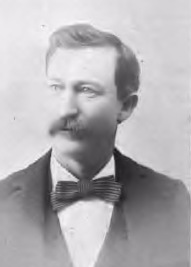 HOWARD, Joseph Edward. The story of the life
of Joseph Edward Howard, of Forest City, is like that of
many others of Iowa's progressive citizens in that his
advancement from the position of a farmer boy in lowly
circumstances to an honored citizen, filling a position
of responsibility, has not been without its trials,
vexations and arduous toil. The parents of Mr. Howard were
natives of Pennsylvania. They removed to
Fayette county, Iowa, in 1855, and engaged in farming.
This vocation was followed until 1869, at which time
they removed to Forest City where they now reside. It
was in Fayette county that Mr. J. E. Howard was born, on
August 31, 1855. He lived on the farm and attended the
common schools until 13 years of age. At 17 he began
teaching, which was followed for four years, a part of
that time in country districts and part in Forest
City. He later entered the
law department of the State university, and was admitted
to the bar on June 8, 1878. From 1879 to 1883, he
followed the practice of law at Forest City, and then
accepted the position as traveling collector in Iowa,
Nebraska, Dakota and Minnesota, which position he held
for seven years. In 1890, he established a real estate
business in Forest City in connection with O. A. Olson,
and the firm is now doing a most excellent business. HOWARD, Joseph Edward. The story of the life
of Joseph Edward Howard, of Forest City, is like that of
many others of Iowa's progressive citizens in that his
advancement from the position of a farmer boy in lowly
circumstances to an honored citizen, filling a position
of responsibility, has not been without its trials,
vexations and arduous toil. The parents of Mr. Howard were
natives of Pennsylvania. They removed to
Fayette county, Iowa, in 1855, and engaged in farming.
This vocation was followed until 1869, at which time
they removed to Forest City where they now reside. It
was in Fayette county that Mr. J. E. Howard was born, on
August 31, 1855. He lived on the farm and attended the
common schools until 13 years of age. At 17 he began
teaching, which was followed for four years, a part of
that time in country districts and part in Forest
City. He later entered the
law department of the State university, and was admitted
to the bar on June 8, 1878. From 1879 to 1883, he
followed the practice of law at Forest City, and then
accepted the position as traveling collector in Iowa,
Nebraska, Dakota and Minnesota, which position he held
for seven years. In 1890, he established a real estate
business in Forest City in connection with O. A. Olson,
and the firm is now doing a most excellent business.
In 1892, the firm of Howard &
Olson organized the banking institution of Howard, Olson
& Ulland, at Buffalo Center, with a capital of
$25,000, fully paid, and the same is to day one of the
solid financial concerns of that county. During his long
residence in Forest City, Mr. Howard has held many
offices of trust and honor. In 1893, he was elected
mayor, without opposition, and in 1894, a member of the
town council, which last named position he has filled up
to the present time. It was during his terms of office
that the city put in a first-class electric light plant
and system of water works, improvements which, by the
way, reflected great credit upon the officers having
them in charge. In 1895, he was appointed clerk of the
district court of Winnebago county, to fill the vacancy
caused by the resignation of Mr. G. S. Gilbertson, who
was elected to represent the Forty-first district in the
state senate, and that position he held until his
successor was elected in 1896, and is now postmaster at
Forest City. He still makes Forest City his home and
dealing in real estate a prominent part of his business.
He has been identified with the history and progress of
his county for the past twenty-five years; has
contributed generously for the public improvements, and
has crowded the avenues of benevolence with good deeds.
He was married in 1879 to Miss Elnora Skinner, of Forest
City, and seven children have been born to them, all of
which are living. He is a prominent Mason and member of
the Odd Fellows.
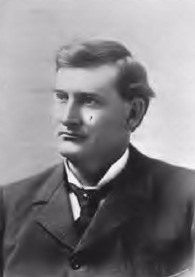 IRISH, Harry Russell, of Forest City, is one
of the leading physicians of Winnebago county. He is the
son of David Irish, who was a native of Vermont and a
farmer in moderate circumstances. He removed to Dane
county, Wis., in an early day, and from there to
Kellogg, Jasper county, Iowa, in 1867, where he died in
1885 at the age of 61. Dr. Irish's mother, Harriet
Brownell, was also a native of Vermont, and died in
October, 1894, at the age of 68 years. The ancestors of
David Irish were Quakers of Norman descent, who came to
America about 1630 to escape religious persecution in
England. The ancestors of Dr. Irish's mother were of
Anglo-Saxon and Dutch descent. They came to America long
before the revolution, and took an active part in that
war. IRISH, Harry Russell, of Forest City, is one
of the leading physicians of Winnebago county. He is the
son of David Irish, who was a native of Vermont and a
farmer in moderate circumstances. He removed to Dane
county, Wis., in an early day, and from there to
Kellogg, Jasper county, Iowa, in 1867, where he died in
1885 at the age of 61. Dr. Irish's mother, Harriet
Brownell, was also a native of Vermont, and died in
October, 1894, at the age of 68 years. The ancestors of
David Irish were Quakers of Norman descent, who came to
America about 1630 to escape religious persecution in
England. The ancestors of Dr. Irish's mother were of
Anglo-Saxon and Dutch descent. They came to America long
before the revolution, and took an active part in that
war.
Dr. H. R. Irish was born October 1, 1860, and
removed with his parents to Kellogg, Jasper county,
Iowa, at the age of 6 years. Here he made his home until
1883, when he located at Forest City. His preliminary
education was obtained in the common country schools,
and he also completed a course at Hazel Dell academy at
Newton. He entered the medical department of the State
university in 1881, and graduated March 7, 1883, and
during the same month located in Forest City, where he
has been in active practice ever since, enjoying a
liberal patronage. He has the satisfaction of knowing
that he has worked his own way to his present rank,
having earned the money to secure his training by
working on a farm. For four years and a half Dr. Irish
served as one of the examining surgeons for the United
States pension department at Mason City. He is a member
of the Iowa State Medical society and of the Austin,
Flint, and Winnebago county medical
societies.
In politics Dr. Irish is a democrat. He served
one term as mayor of Forest City, beginning in March,
1893, and is at present a member of the board of
education. He holds no church
membership.
The doctor was married April 8, 1887, to Alice S.
Peirce, at Cedar Falls, Iowa. They have two
children, Leita, who was born June 5, 1889, and Thomas
J., born February 4, 1897.
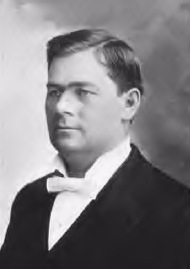 JOICE, Peter Martin, at present a resident of
Lake Mills, might very properly be termed the young
Napoleon of finance in northern Iowa. Although born as
late as the breaking out of the civil war he now holds
foremost positions of responsibility in half a dozen
banks, and is among the chief promoters of several
business enterprises of considerable magnitude. His father, E.
J. Joice, was born in Bergen, Norway, in 1827. The early
years of his life were spent in farming and the
manufacturing of cooperage. He came to this country in
1848, and located in Stoughton, Wis., where he ran a
cooper shop for thirteen years. He removed to Forest
City in 1879, where, for the last twelve years of his
life, he was engaged in the lumber business. The mother
of Mr. Joice was one of a prominent family in Norway, a
brother having been a member of parliament for fourteen
years. JOICE, Peter Martin, at present a resident of
Lake Mills, might very properly be termed the young
Napoleon of finance in northern Iowa. Although born as
late as the breaking out of the civil war he now holds
foremost positions of responsibility in half a dozen
banks, and is among the chief promoters of several
business enterprises of considerable magnitude. His father, E.
J. Joice, was born in Bergen, Norway, in 1827. The early
years of his life were spent in farming and the
manufacturing of cooperage. He came to this country in
1848, and located in Stoughton, Wis., where he ran a
cooper shop for thirteen years. He removed to Forest
City in 1879, where, for the last twelve years of his
life, he was engaged in the lumber business. The mother
of Mr. Joice was one of a prominent family in Norway, a
brother having been a member of parliament for fourteen
years.
Mr. Peter Martin Joice was born in Greene county,
Wis., January 4, 1860. Following the
regular period in the public schools of his native town
he attended the colleges of Albion and Janesville,
graduating from the last named institution in 1878. In
May, 1879, he engaged in the lumber business with his
father, at Forest City, and earned his first money of
any consequence during that partnership. In the fall of
1880 he entered the Winnebago County bank as bookkeeper,
and in 1883 was taken in as special partner, and made
cashier. In July, 1886, he entered into partnership with
Secor, Law & Plummer, bankers of Forest City, under
the firm name of P. M. Joice & Company. This firm
organized a bank at Lake Mills, and the same was placed
in charge of Mr. Joice, by whose intelligent management
it has been firmly grounded among the solid financial
institutions of that section of the state. Besides
owning the greater share of the stock in the bank last
mentioned, Mr. Joice is vice-president of the First
National bank at Wells, Minn., director in the First
National bank at Albert Lea, president of the First
National bank of Britt, Iowa, and president First
National bank of Buffalo Center, Iowa. Mr. Joice is
considered one of the best financiers in his section of
the country, and there is no one who stands more ready
to help his town than does he. He has served in the
capacity of mayor for two terms, has been a member of
the city council and school board for six years, and was
re-elected to the same positions at the recent
elections.
He takes a warm interest in matters pertaining to
education, and has contributed generously of his time
and means toward bringing the schools of his town up to
their present high standing.
In June, 1896, he was elected a
trustee of Cornell college at Mt Vernon. Religiously, he
is a member of the M. E. church, and a trustee of the
denomination of that faith in Lake Mills; politically,
he is a republican. He was united in marriage on January
2, 1883, to Miss Ida M. Law, and three children, Marie,
Wilford and Katherine, have been born to
them.
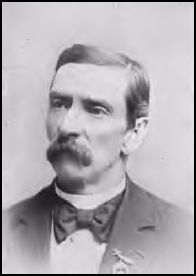 LLOYD, John B., of Lake Mills, is a native of
Ohio, having been born in Cincinnati on September 15,
1843. He received his education in the district,
intermediate and high schools of Cincinnati, and at the
age of 16 became an apprentice in the trade of pattern
making. While thus employed the civil war broke out and
he promptly enlisted in Company L, Fourth Ohio Volunteer
cavalry. He participated in twenty-two engagements,
commencing with the tight at Perryville, Ky.; was in the
campaign to Atlanta, and back to Nashville; then the
siege of Nashville, after Hood was repulsed; then Selma
and Macon, including the side expeditions, and
throughout all of the severe fighting done by that
division of the army up to June, 1865, when he was
discharged. He returned at once to Cincinnati to finish
the term of his apprenticeship, but a throat trouble,
contracted in the army, compelled him to seek different
employment. He engaged as bookkeeper for a large
commission house, but at the end of one year purchased
an interest in the firm of E. H. Cowing Company. Later he engaged
in the manufacture of tobacco, then accepted the
position of clerk on the steamer "Robert Mitchell,"
plying between Cincinnati and New Orleans. Tiring of that
kind of a life he became bookkeeper for the wholesale
candy manufacturing concern of E. Myers & Company,
of Cincinnati. He remained with that company five years,
then spent a year on the river; then conducted a coal
business for a time, and finally became a member of the
confectionery company with which he had formerly been
connected. LLOYD, John B., of Lake Mills, is a native of
Ohio, having been born in Cincinnati on September 15,
1843. He received his education in the district,
intermediate and high schools of Cincinnati, and at the
age of 16 became an apprentice in the trade of pattern
making. While thus employed the civil war broke out and
he promptly enlisted in Company L, Fourth Ohio Volunteer
cavalry. He participated in twenty-two engagements,
commencing with the tight at Perryville, Ky.; was in the
campaign to Atlanta, and back to Nashville; then the
siege of Nashville, after Hood was repulsed; then Selma
and Macon, including the side expeditions, and
throughout all of the severe fighting done by that
division of the army up to June, 1865, when he was
discharged. He returned at once to Cincinnati to finish
the term of his apprenticeship, but a throat trouble,
contracted in the army, compelled him to seek different
employment. He engaged as bookkeeper for a large
commission house, but at the end of one year purchased
an interest in the firm of E. H. Cowing Company. Later he engaged
in the manufacture of tobacco, then accepted the
position of clerk on the steamer "Robert Mitchell,"
plying between Cincinnati and New Orleans. Tiring of that
kind of a life he became bookkeeper for the wholesale
candy manufacturing concern of E. Myers & Company,
of Cincinnati. He remained with that company five years,
then spent a year on the river; then conducted a coal
business for a time, and finally became a member of the
confectionery company with which he had formerly been
connected.
Having secured a large tract of land in Winnebago
and Hancock counties, Iowa, Mr. Lloyd concluded to come
west and look after his new purchase. It was his
intention at first to open up a stock farm, but the firm
of Pickering, Hartley & Harwood, of Lake Mills,
tendered him a position in their office, which was
accepted and held for some eight years. He then bought
out the firm, taking in with him as a partner Mr. D. N. Hill, and
the business was carried on by those gentlemen until
1895, when Mr.
Hill's interest was purchased by Mr. Lloyd. Later Jacob
Larson and his son, John R. Larson, were taken into the
firm, and it is now one of the leading banking, real
estate and loan institutions in that section of the
state. Mr. Lloyd is a nephew of Thomas Bebb, governor of
the state of Ohio, away back in the 40's. He was married
to Miss Mary C. Wade, daughter of Capt. R. M. Wade, who
was commander of the gunboat "Corondolet" during the
late war, and afterwards had charge of a number of boats
on the lower Mississippi. Captain Wade was
a grandson of Chief Justice Marshall, of
Virginia.
Mr. Lloyd is a man of wide and varied
experiences. He has seen the ins and outs of life as few
men are privileged to see them, and the bruises against
the rough edges have made him considerate, generous and
knowing. He has reared a family of three children, two
girls and one boy, all married. The son, Richard, is
postmaster at Lake Mills.
Mr. Lloyd's success in life is to be largely
attributed to his contact with and the advance of Iowa
land, and it should serve as a valuable suggestion to
young men.
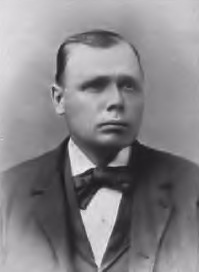 NELSON, N. I. Mr. Nelson is engaged in the
general merchandise and wholesale grocery business at
Lake Mills, being a member of the well-known Scar Nelson
Merchandise company. NELSON, N. I. Mr. Nelson is engaged in the
general merchandise and wholesale grocery business at
Lake Mills, being a member of the well-known Scar Nelson
Merchandise company.
He is descended on his father's side from the old
Vikings.
His mother's grandfather was of Teuton descent,
but his own grandfather was born in Norway, and served
in the war of 1812 for his native country. Iver Nelson,
the father of N. I. Nelson, landed in New York on the
1st day of July, 1851. having crossed the Atlantic in a
sailboat. He was more than three months in making the
voyage.
From New York he went by water to Milwaukee, and
with an ox team drove overland to Stoughton, Wis. He
assisted in the construction of the first railroad
leading west of Chicago. In 1853 he settled in
Winneshiek county, this state, where he was married, in
1856, after which he removed to Mitchell county and
engaged in farming. At the present time he resides in
St. Ansgar, and is among the wealthiest citizens of that
place. His mother, Ingelberg Rosby Nelson, came from
Quebec to Winneshiek county July 4, 1856, where she was
married to the father of our subject.
Mr. N. I. Nelson was born June 1, 1857, at
Calmar, Winneshiek county. He was given a good common
school education and in addition took two courses at the
St. Ansgar
seminary and a commercial course at the Decorah college,
from which he graduated in the spring of 1882. He worked
upon a farm, however, until he had accumulated $1,000.
In June, 1882, he entered the hardware store of Johnson
& Annis, at Osage, as clerk at $20 per month. Shortly
thereafter his salary was raised to $35 per month, and
in less than one year to $50 per month. That position he
held until the spring of 1886, when he removed to Lake
Mills and formed a partnership with Mr. 0. Scar in the
general merchandise business under the style of Scar
& Nelson. This firm is still in existence, operating
three stores, with extensive cold storage facilities,
and also a canning factory. The last named enterprise is
known as the Lake Mills Canning company, and is an
institution that has proved of inestimable value to the
farmers of that section.
Mr. Nelson, in addition to the concerns
mentioned, is largely interested in the Arlington Hotel
company. He is an energetic businessman, and by
honorable dealing, economy and good business judgment,
will, if he lives, become as well off in this world's
goods as is bis father. He has always voted the
republican ticket, but has never held office except such
as have been forced upon him. He has served as mayor of
his town, and was for six years member of the city
council. He is a member of the United Lutheran church,
the Masonic order and the A. O. U. W. June 2, 1883, he
was married to Miss Anna C. Sorbon, of Rock Creek. They
have two children, Eda E. and Irving A., 9 and 5 years
of age, respectively.
 OLSON, O. A., a prosperous clothing merchant
of Forest City, was born in Winneshiek county, Iowa,
November 11, 1860, the son of John S. and Anna Nelson
Olson. They were farmers at that time, but for
twenty-five years have been engaged in the mercantile
business. Mr. J.
S. Olson was a soldier in the union army, serving
in Company K, Thirty-eighth Iowa. He and his wife were
born in Norway and came to this country in 1850 and
1852. The family moved to Forest City in the year 1870,
and the children received a common school education
there. OLSON, O. A., a prosperous clothing merchant
of Forest City, was born in Winneshiek county, Iowa,
November 11, 1860, the son of John S. and Anna Nelson
Olson. They were farmers at that time, but for
twenty-five years have been engaged in the mercantile
business. Mr. J.
S. Olson was a soldier in the union army, serving
in Company K, Thirty-eighth Iowa. He and his wife were
born in Norway and came to this country in 1850 and
1852. The family moved to Forest City in the year 1870,
and the children received a common school education
there.
While yet a boy O. A. was put to work in his
father's store and his first savings were the nickels he
earned by running errands. When he was 22
years old, in January, 1883, his father gave him a
working interest in the store and the firm name was J.
S. Olson & Son. The father sold his interest in the
store to his son April 8,1890, and two years later the
latter sold the business and went into the real estate
business with J. E. Howard, which partnership was
dissolved in the summer of 1895. In September of that
year the present business, Olson Bros. & Co., was
started, Mr. Olson's brother, W. A. Olson, being
a member of the firm.
Mr.
Olson, who has always been a republican, was
elected mayor of Forest City in March, 1888, and in the
great presidential campaign of 1896 he was chairman of
the republican county committee. He belongs to the
Forest City Commercial club, the Masonic Lodge, Bethel
Chapter No. 26, of Garner, St. Elmo Commandery, Iowa
Falls, El Kahir Temple, Cedar Rapids, Iowa, and to the
Odd Fellows, Knights of Pythias and the Elks lodge, the
latter in Mason City. He was married September 8, 1885,
to Annette Carlburg, of Neenah, Wis. They have one
son, Sylvan Leander, born June 27, 1886. Mrs. Olson died
July 10, 1889, after a long, lingering illness, of
consumption.
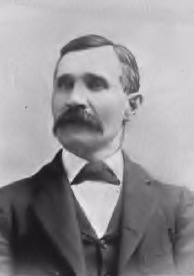 SCAR, Ole, of Lake Mills, is a good type of
thrifty, intelligent class of citizens which Norway has
contributed to this country. Beginning life with no
other capital than energy, perseverance and good sense,
he has succeeded in acquiring a very comfortable
fortune, and in being classed among the most prosperous
merchants of the state. He was born August 11, 1845, at
Bang, Norway. His early educational advantages were
somewhat limited, but by the aid of self-instruction, he
fitted himself for business, so that at the age of 12 he
secured a position as clerk in a store, where he
remained about five years. But feeling the need of a
more complete and thorough education, he petitioned for
admittance to the Sargeant Military school, at
Christiania, where he was accepted, and in 1866
graduated with first honors, as sergeant. Not satisfied,
however with the future which a military life offered,
he secured his discharge and permission to emigrate to
America, the requests not being granted until after
three successive petitions. SCAR, Ole, of Lake Mills, is a good type of
thrifty, intelligent class of citizens which Norway has
contributed to this country. Beginning life with no
other capital than energy, perseverance and good sense,
he has succeeded in acquiring a very comfortable
fortune, and in being classed among the most prosperous
merchants of the state. He was born August 11, 1845, at
Bang, Norway. His early educational advantages were
somewhat limited, but by the aid of self-instruction, he
fitted himself for business, so that at the age of 12 he
secured a position as clerk in a store, where he
remained about five years. But feeling the need of a
more complete and thorough education, he petitioned for
admittance to the Sargeant Military school, at
Christiania, where he was accepted, and in 1866
graduated with first honors, as sergeant. Not satisfied,
however with the future which a military life offered,
he secured his discharge and permission to emigrate to
America, the requests not being granted until after
three successive petitions.
Mr. Scar sailed for this country in July, 1868,
when not quite 23 years old, and first settled in Black
Earth, Wis.
Here he secured work at once as clerk in a store,
and after remaining a year concluded to go farther west
and accordingly located at West Mitchell, in Mitchell
county, Iowa. His funds being limited, he was unable to
start in business for himself, so he was again employed
a9 clerk. While here he became acquainted with William
Larson, a businessman of Osage, who was so well pleased
with young Scar that he offered him a position as
manager of a branch store at Lake Mills. He conducted the
business so successfully at this place that Mr. Larson
soon sold out his stock at Osage and established himself
at Lake Mills, where the two men prospered well until
the mill burned in 1871. This misfortune caused a check
on all trade, as the mill had been the life of what was
then a small trading post. The dullness of business made
Mr. Scar restless, and in 1871 he went to California to
try the gold fields. He was quite
successful at first, but soon feeling that luck was not
with him there, he concluded to go to Puget Sound, where
it was expected that the Northern railway would
terminate. He settled at Olympia, Wash., where he
entered eighty acres of land in hopes of striking the
terminus.
The railroad project finally failed, but Mr. Scar proved up
on his land, which he still owns, and in 1874 returned
to Iowa. He formed a partnership with his former
employer, Mr. Larson, and after a few years bought him
out, but the connection was again resumed, and finally
dissolved in 1880. Soon after this Mr. Scar purchased
the business of S. D. Wadsworth & Co., which he
conducted alone until 1883, when he entered into
partnership with his brother-in-law, N. I. Nelson, and
in 1893 the firm was incorporated under the name of the
Scar-Nelson Mercantile Co., and has been very
successful, enjoying a wide patronage. Mr. Scar has also
dealt considerably in real estate. Mr. Scar is a
bachelor.
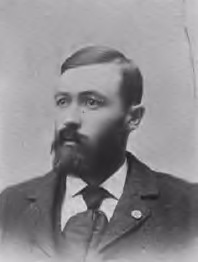 SECOR, Ellsworth E., cashier and resident
manager of the Buffalo Center State bank at Buffalo
Center, and a nephew of Eugene Secor, of Forest City,
whose sketch appears elsewhere in this work, is one of
the most prominent and progressive young business men in
northern Iowa.
He wu born January 2, 1864, at Forest City, Iowa.
His father is the Hon. David Secor, now president of the
Faribault County bank. of Winnebago City, Minn., also
president of the bank of Amboy, Amboy, Minn., Devlevan
bank, Delevan.
Minn. He Is also director of the First National
bank, of Forest City Iowa, his former home. He was a
representative from his district in the house of
representatives in the Iowa legislature for two terms
during the years 1872-1874, and was twice elected
register of the Iowa state land office. He was one of
the early settlers of Winnebago county, coming there in
1858. He was county treasurer two terms during the
sixties, occupying that position during the war, but
hiring a substitute for his office, he joined the union
army and was in Sherman's march to the sea. Mrs. Secor's
maiden name was Samantha Van Curen. She died when
Ellsworth E. was but 7 years old. SECOR, Ellsworth E., cashier and resident
manager of the Buffalo Center State bank at Buffalo
Center, and a nephew of Eugene Secor, of Forest City,
whose sketch appears elsewhere in this work, is one of
the most prominent and progressive young business men in
northern Iowa.
He wu born January 2, 1864, at Forest City, Iowa.
His father is the Hon. David Secor, now president of the
Faribault County bank. of Winnebago City, Minn., also
president of the bank of Amboy, Amboy, Minn., Devlevan
bank, Delevan.
Minn. He Is also director of the First National
bank, of Forest City Iowa, his former home. He was a
representative from his district in the house of
representatives in the Iowa legislature for two terms
during the years 1872-1874, and was twice elected
register of the Iowa state land office. He was one of
the early settlers of Winnebago county, coming there in
1858. He was county treasurer two terms during the
sixties, occupying that position during the war, but
hiring a substitute for his office, he joined the union
army and was in Sherman's march to the sea. Mrs. Secor's
maiden name was Samantha Van Curen. She died when
Ellsworth E. was but 7 years old.
Mr. Secor, in early life attended the public
schools of Forest City, and in 1881 entered the Iowa
Agricultural college at Ames, but before completing the
freshman year was taken sick and did not complete his
course. His
father was Identified with the building of the Chicago,
Iowa & Dakota railway, known as the "Slippery Elm"
road, so the ambitious young man concluded to fit
himself for future life in the railway service. He put
in four years as freight brake-man, mostly on the Winona
& St. Peter division of the Chicago &
Northwestern railway, and later on the What Cheer branch
of the same railway, out of Belle Plaine. Near that
place, in the winter of 1886-87, he nearly lost his life
one frosty morning just before daylight, by stumbling
between the tender and the first car, striking on the
draw bar and cutting through his heavy clothing and
through the flesh of one leg, to the bone. He realized
his perilous position and managed somehow to climb to
the top of the car, where he fainted, but was brought to
his senses by the cold air; this experience caused him
to change his occupation.
His father was preparing to remove to Minnesota
and wanted him to go to Forest City, and, in a measure,
take his place in the firm of Secor Brothers & Law.
This he accordingly did, leaving Belle Plaine, his
former headquarters, January 25, 1887, to take charge of
the conveyance and abstract work of his father's firm,
remaining with them until July, 1892, when he took
charge of the Iowa Investment company's business at
Buffalo Center. The company soon began to do an exchange
and banking business, Mr. Secor occupying the
responsible position of secretary and resident manager
of the company's business. The banking feature of the
business grew so rapidly that a separate institution for
that purpose was organized, and the Buffalo Center
Savings bank was launched forth January 16, 1893, with
Mr. Secor as its cashier. In February, 1894, the two
institutions were merged into one, and thus the Buffalo
Center State bank was organized and commenced business
February 12, 1894, with a capital of $25,000. It is
still the principal bank of the town with the following
named officers: G. S. Gilbertson, president; C. J.
Thompson, vice-president, and E. E. Secor, cashier. The
bank has built up a fine business, has a surplus fund of
$8,000, pays 15 percent dividends to its stockholders
and has deposits amounting to over $55,000. On January
1, 1899, Mr. Secor, in connection with H. G. Gardner, G.
S. Gilbertson, C. J. Thompson, F. W. Thompson, and
F. L. Kelley, all prominent bankers of northern Iowa,
formed a limited partnership, and are now operating a
bank at Titonka, Kossuth county, under the firm name and
style of Secor & Gardner, of which Mr. Secor is
president.
Mr. Secor has always been a staunch
republican, filled the office of city clerk of Forest
City; was the first mayor of Buffalo Center, refusing
re-election, but in 1896, he was chosen by the citizens'
caucus and elected without any opponent. Re-elected in
1897 and resigned mayor ship July 1, 1897, on
appointment by President McKinley as postmaster at
Buffalo Center. He was also nominated as a candidate for
school director and received every vote cast, and
re-elected in 1898. He is a member of Truth Lodge No.
213, A. F. & A. M. at Forest City; Camp No. 2659
Modern Woodmen of America; Bison Lodge No. 379, and
Buffalo Center Lodge No. 596, I. O. O. F., all of
Buffalo Center. He was married April 27, 1887, to Emma
J. Harmon, of Jewell, Hamilton county, Iowa, at Webster
City. They have four children, Ethel Jozella, born March
24, 1888, Russell Harold, born September 20, 1889, Beryl
Joy, born June 8, 1894, and Raymond, born November 22,
1898.
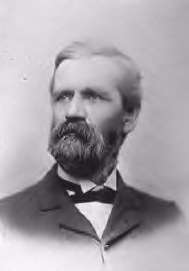 SECOR, Eugene, of Forest City, is descended
on his father's side from a family of French Huguenot
refugees, who came to America in 1689 and settled in New
York. The name is spelled in the letters of denization
S-y-c-a r-d, but has gradually evolved into the present
name, Secor.
His ancestors on both sides were participants in
the revolutionary struggle. British soldiers were the
terror of the country where they lived. They were all
loyal to the American cause, and this subject is a "Son
of the American Revolution " by virtue thereof. The
father of Mr. Secor was an enthusiastic horticulturist
of his time.
He was also justice of the peace for many years,
and among the attorneys who practiced in his court was
Chauncey M. Depew.
His mother was Sarah Caroline Knapp, whose mother
was a Lee prominent among the leading families in
Yorktown. SECOR, Eugene, of Forest City, is descended
on his father's side from a family of French Huguenot
refugees, who came to America in 1689 and settled in New
York. The name is spelled in the letters of denization
S-y-c-a r-d, but has gradually evolved into the present
name, Secor.
His ancestors on both sides were participants in
the revolutionary struggle. British soldiers were the
terror of the country where they lived. They were all
loyal to the American cause, and this subject is a "Son
of the American Revolution " by virtue thereof. The
father of Mr. Secor was an enthusiastic horticulturist
of his time.
He was also justice of the peace for many years,
and among the attorneys who practiced in his court was
Chauncey M. Depew.
His mother was Sarah Caroline Knapp, whose mother
was a Lee prominent among the leading families in
Yorktown.
Mr. Eugene Secor. was born May 13, 1841, near
Peekskill, N. Y. He never attended any except the New
York country school, until 21 years of age. The family
consisted of eleven children, and, being in only
moderate circumstances, much of their time was required
in clearing their land of stones and trees. Without
educational advantages himself his father wanted the
children to be more fortunate, and made them so by
providing a good library, containing the best works in
literature of that day.
In the spring of 1862 Mr. Secor came to Iowa. It
may be asked why he did not go south. There were many
reasons, for he was not disloyal. He never shirked a
duty to his country and he did enlist in the 100 day
service, but for some reason the company was never
called out. It must be understood that he lived at the
time more than a hundred miles from railroad or
telegraph. In 1864 he entered Cornell college, but in
the fall of the same year was called home to look after
his brother's business as county treasurer, he having
gone to the front in the service of Uncle Sam. That
ended his school life. His practical
business education was in the county offices of
Winnebago county, where he was deputy treasurer two
years, deputy clerk for one year, clerk for six years,
deputy auditor one year and auditor four
years.
In 1880 he entered into partnership with his
brother, David Secor, and John Law, under the style
Secor Brothers & Law, to carry on a real estate
business, but through the retiring of Mr. Law in 1893,
whose place was taken by Willard Secor, the firm is now
known as Secor Brothers & Co. In 1882 the firm of
Secor Brothers & Law erected the brick block in
which the First National bank of Forest City is now
located, and established the City bank, with B. A. Plummer added
to the banking firm.
In 1893 the bank was nationalized. Mr. Secor is one of
its directors and its vice-president. He is also a
member of the banking firm of P. M. Joice & Co., of
Lake Mills, and has connections with four similar
enterprises in Minnesota. Another concern in which he is
a director and stock-holder is the Forest City Electric
Light and Power company.
Although nurtured in the lap of democracy, of the
pro-slavery type, Mr. Secor is and always has been a
republican. His early training was received during
Seymour's feign in New York and Buchanan's weakness in
Washington. He has been a delegate to nearly every state
convention for the past fifteen years, and was a Tenth
district delegate to the National Republican convention
held at Minneapolis in 1892, and supported Harrison. He
has been identified for many years with the State
Horticultural society, was its president two years, and
is at this time a director thereof and manager of one of
its experiment stations. He was sole judge at the
World's fair and at the Omaha exposition in the
department of the apiary. He is a
prominent beekeeper, and not uncommonly has a ton of
honey in a season. He has been president of the National
Beekeepers' society, and is at present its treasurer and
general manager. The Twenty-second General Assembly
elected him as a trustee of the Agricultural college,
which position he held tor six years. He has been for
many years, and still is, a trustee of Cornell college
and one of its executive committee. Was one of two
delegates from the Northwest Iowa conference to the
general conference of the M. E. church in 1892. He was the first
mayor of Forest City, and re-elected to the same office
three times. Was on the council for many years
following. Has been a member of the board of education
for many years, and is now its president. He organized
the Winnebago County Agricultural society, and was its
president for two years.
Mr. Secor has contributed to the papers and
magazines, both literary and technical, for many years.
He wrote by request, a resume of the apiarian industry
in the United States and its representation at the
Chicago fair, for publication in the permanent records
of the World's Columbian exposition.
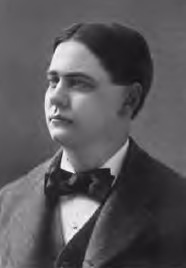 THOMPSON, F. W. The Thompson family, of which
the subject of this sketch is a member, no doubt
inherited the ability of an illustrious father, Mr. O.
P. Thompson, the father, is a wealthy dry goods merchant
of Decorah, Iowa. The beginning of his present fortune
was made in McGregor. Born in Norway
in 1834, he came to this country in 1853, and located in
Decorah early in the sixties. He passed through all the
panics from war times up to the present, but by keen
business judgment, and ability of a high order,
succeeded in keeping safely without the whirlpools which
carried many great men down. Of the five children that
were born to him several have attained distinction in
the financial circles of the country. Edward T. is
president of the First National bank of St. Thomas, N.
D.; Charles J.
holds a like position in the Forest City National
bank, and T. A. Thompson is junior member of the firm of
0. P. Thompson & Sons at St. Thomas. Edward T. is
also the present grand chancellor of the Knights of
Pythias for the state of South Dakota and has served
four years as county treasurer of Pembina county, in the
state of North Dakota. THOMPSON, F. W. The Thompson family, of which
the subject of this sketch is a member, no doubt
inherited the ability of an illustrious father, Mr. O.
P. Thompson, the father, is a wealthy dry goods merchant
of Decorah, Iowa. The beginning of his present fortune
was made in McGregor. Born in Norway
in 1834, he came to this country in 1853, and located in
Decorah early in the sixties. He passed through all the
panics from war times up to the present, but by keen
business judgment, and ability of a high order,
succeeded in keeping safely without the whirlpools which
carried many great men down. Of the five children that
were born to him several have attained distinction in
the financial circles of the country. Edward T. is
president of the First National bank of St. Thomas, N.
D.; Charles J.
holds a like position in the Forest City National
bank, and T. A. Thompson is junior member of the firm of
0. P. Thompson & Sons at St. Thomas. Edward T. is
also the present grand chancellor of the Knights of
Pythias for the state of South Dakota and has served
four years as county treasurer of Pembina county, in the
state of North Dakota.
Mr. F. W. Thompson was born at Decorah, Iowa,
April 6, 1869. He graduated in the high schools there,
and later took a business course under the tutorship of
an expert accountant. He was then engaged as a clerk in
his father's mercantile establishment, where he remained
for four years. It was his early ambition to become a
banker, and when an opportunity was presented to enter
that business in connection with Thompson Brothers, at
Forest City, the same was promptly accepted. This firm,
while of the same name, were in no way related to F. W.
Thompson.
In October, 1892, the banking institution of
Thompson Brothers & Thompson began business, with
Mr. F. W. Thompson as cashier. He held, in addition to
that office, the position of treasurer of the Chicago
and Iowa Western Land and Town Lot company, a
corporation of $75,000 capital, and embracing within its
assets 2,500 acres of choice land adjoining the town of
Thompson, including the town site. Negotiations are
about concluded, however, whereby Mr. Thompson will
dispose of his interest in this corporation and identify
himself with a bank of large capital, of which he will
be the principal officer and manager. He has always been a republican, and has taken a
lively interest in the campaigns of his party, but has
held no office except that of alderman in his own town.
Being unmarried he is socially quite popular, and holds
the foremost office in several clubs of considerable
social note. He is a past grand officer in the order of
Odd Fellows, and venerable consul in Camp 7, of the
Modern Woodmen of America. He belongs to no church, but
is trustee of the Baptist organization at Thompson. Mr.
Thompson is now cashier of the First National bank of
Thompson, Iowa, and president of the Citizens State bank
of Lakefield, Minn.
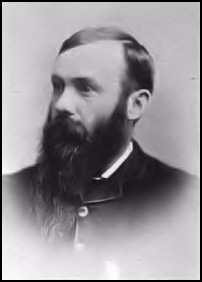 THOMPSON, John Foster. Well versed in the law
and in the monetary affairs of the state is Mr. J. F.
Thompson, of Forest City. His father was a farmer in
northern Iowa, in only moderate circumstances. His
mother was a cousin of Salmon P. Chase, a member of
Lincoln's cabinet. His grandmother on his father's side
was a sister of Sir Thomas Bell, of Belfast, Ireland,
who was a leader of one of the Irish rebellions. Mr. J.
F. Thompson was born near Carey, Ohio, September 3,
1848. THOMPSON, John Foster. Well versed in the law
and in the monetary affairs of the state is Mr. J. F.
Thompson, of Forest City. His father was a farmer in
northern Iowa, in only moderate circumstances. His
mother was a cousin of Salmon P. Chase, a member of
Lincoln's cabinet. His grandmother on his father's side
was a sister of Sir Thomas Bell, of Belfast, Ireland,
who was a leader of one of the Irish rebellions. Mr. J.
F. Thompson was born near Carey, Ohio, September 3,
1848.
His parents removed to Iowa in 1857, at which
time Mr. Thompson was quite young, so his early
education was obtained in the county schools of the
old-fashioned sort in Clayton county. This, however, was
supplemented with a special course in English, Latin and
mathematics in the Iowa State university. His legal
education was obtained in the law department of the same
university, from which he graduated in 1875, and his
business education at a branch commercial school of
Bryant & Stratton's. After graduating he was
appointed deputy register of the state land office,
which position he held until 1876, at which time he
resigned and removed to Forest City to engage in the
practice of law. In 1877 he organized the Winnebago
County bank, later made a state bank, of which he is the
vice-president. Mr. Thompson is connected one way or
another with many other banking institutions besides the
one which receives his personal supervision. He is one
of the managers of the Citizens bank of Britt, the
Buffalo Center State bank and the State bank of
Thompson. Together with his brother, he organized the
Chicago & Iowa Western Railway company, which built
the Forest City division of the Burlington,Cedar Rapids
& Northern, and the Chicago & Iowa Western Land
and Town Lot company, an organization that has done much
in the way of developing that section of the
state.
Mr. Thompson enlisted in Company I, Eighth Iowa
cavalry, but was rejected on account of age. In a second
trial in the Fourth Iowa battery he was more successful,
being made battery bugler. He served in the Gulf
department under Generals Canby and Banks. He was
severely wounded in the right thigh in an engagement in
northwestern Louisiana, and was given an honorable
discharge, having served a little more than two years,
and not being 17 years old when mustered out. He is a member
of the G. A. R., and was appointed a member of the staff
of Department Commander Mills, and inspector-general of
Iowa by Department Commander Thompson. He is present
commander of Hayden Post He has always been a republican
and prohibitionist but not a third party prohibitionist;
was chairman of the county central committee, and under
his administration Winnebago county won the Tippecanoe
banner. He was at one time mayor of Forest City,
president of its board of education and president of the
board of trade. Mr. Thompson had the honor to be one of
the two delegates to the National Farmers' congress,
appointed by Governor Larrabee and reappointed by
Governor Boies. He belongs to the Masons, Knights
Templars, Odd Fellows and Knights of Pythias. Several
years ago he united with the Methodist church, but now
affiliates with the Congregationalists. He was married
December 22, 1875, to Miss Julia A. Clark, oldest
daughter of Judge Robert Clark, of Winnebago county,
well known in the early 60's Six children were born to
them, three of whom are now
living.
The information on Trails to
the Past © Copyright may
be used in personal family history research,
with source citation. The pages in entirety may
not be duplicated for publication in any fashion
without the permission of the owner. Commercial
use of any material on this site is not
permitted. Please respect the wishes of
those who have contributed their time and
efforts to make this free site possible.~Thank
you! |